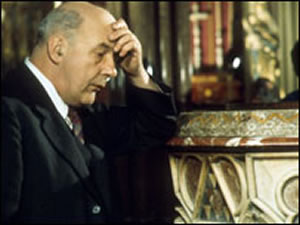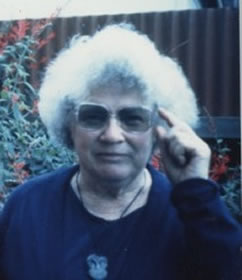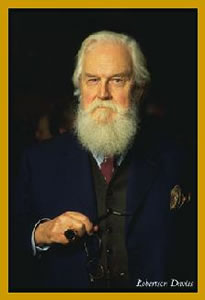De Engelse dichter en literatuurcriticus Sir John Betjeman werd geboren in Londen op 28 augustus 1906. Zie ook mijn blog van 28 augustus 2009 en ook mijn blog van 28 augustus 2010
In Westminster Abbey
Let me take this other glove off
As the vox humana swells,
And the beauteous fields of Eden
Bask beneath the Abbey bells.
Here, where England’s statesmen lie,
Listen to a lady’s cry.
Gracious Lord, oh bomb the Germans,
Spare their women for Thy Sake,
And if that is not too easy
We will pardon Thy Mistake.
But, gracious Lord, whate’er shall be,
Don’t let anyone bomb me.
Keep our Empire undismembered
Guide our Forces by Thy Hand,
Gallant blacks from far Jamaica,
Honduras and Togoland;
Protect them Lord in all their fights,
And, even more, protect the whites.
Think of what our Nation stands for,
Books from Boots’ and country lanes,
Free speech, free passes, class distinction,
Democracy and proper drains.
Lord, put beneath Thy special care
One-eighty-nine Cadogan Square.
Although dear Lord I am a sinner,
I have done no major crime;
Now I’ll come to Evening Service
Whensoever I have the time.
So, Lord, reserve for me a crown,
And do not let my shares go down.
I will labour for Thy Kingdom,
Help our lads to win the war,
Send white feathers to the cowards
Join the Women’s Army Corps,
Then wash the steps around Thy Throne
In the Eternal Safety Zone.
Now I feel a little better,
What a treat to hear Thy Word,
Where the bones of leading statesmen
Have so often been interr’d.
And now, dear Lord, I cannot wait
Because I have a luncheon date.

John Betjeman (28 augustus 1906 – 19 mei 1984)
De Duitse schrijver en vertaler Elmar Schenkel werd geboren in Hovestadt (Westfalen) op 28 augustus 1953. Zie ook mijn blog van 28 augustus 2009 en ook mijn blog van 28 augustus 2010
Uit: H. G. Wells
“Das Vergessen ereilt Autoren auf die unterschiedlichste Art. Fehlende Resonanz beim Publikum oder Eigenbrötlerei der Schreibenden mögen in den meisten Fällen genügen. Das Vergessen bedient sich jedoch einer genialeren Strategie, wenn es dafür sorgt, daß sich Autoren mit ihren Werken und Ideen so weit ausdehnen, daß diese einen gasförmigen Zustand erreichen und von der Wirklichkeit nicht mehr zu unterscheiden sind. Literaturgeschichte erweist sich dann als eine Folge von Aggregatzuständen, die nur mühsam zu rekonstruieren sind. Denn wie verflüssigt und verfestigt man literarisches Gas und macht es so wieder beschreibbar? Wie rekonstruiert man eine Landkarte, die mit der Landschaft identisch, mithin unsichtbar geworden ist? Vor dieses Problem stellt uns heute Herbert George Wells, der zur Blüte des Viktorianismus, 1866, geboren wurde und ein Jahr nach Abwurf der ersten Atombomben starb. Lange Zeit war er der Repräsentant englischer Literatur. Schon Zeitgenossen bewunderten seine merkwürdige Ausdehnungskraft. Sein weltanschaulicher Gegner und Freund G. K. Chesterton nahm sich in seinem Buch Heretics (Ketzer, 1905), in dem er den Zeitgeist der anbrechenden Moderne genüßlich entgrätete, des Phänomens an. In einem Kapitel über “Mr. H. G. Wells und die Riesen” weist er darauf hin, daß Wells der einzige Zeitgenosse sei, der nicht aufhöre zu wachsen; nachts, wenn man wach im Bett liege, könne man ihn wachsen hören.”

Elmar Schenkel (Hovestadt, 28 augustus 1953)
De Nieuw-Zeelandse dichteres en schrijfster Janet Frame werd geboren in Dunedin en groeide op in Oamaru. Zie ook
mijn blog van 28 augustus 2009 en ook mijn blog van 28 augustus 2010.
The Landfall Desk
Desk, your Landfall people segmented within the drawers,
your sides battered, knocked at by writers wanting to get out and into Print,
your body sawn in half and rejoined, your toes cut off,
You squat in the middle of the room
You don’t dare to attack now with your sharp corners
the passing literary aspirants breathing their cherished syllables.
You malicious, magnificent-mileaged one-owner desk,
you were kind in your time,
used kindly, too,
were never at the mercy of a mad shifter of furniture
trained for the secondhand kill, bred among giraffe pianos
and minute waltzes, quite mad, mad among the mahogany and walnut.
I think I will keep you, malicious desk.
You refuse to stay tidy, you get stuck and you wobble on your cut legs
The edges of the wound around your middle
will never meet again; you are unbalanced, overweight.
I remember the day I took you in,
a Dunedin day of generous cloud
— no niggardly blowaway tufts in those journeying skies
pursuing their massive somewhere along a one–track wind from the mountains to the sea
towards the north, the Peninsula and beyond.
There was some suggestion that day, I remember, that I remove my front door to admit you.
It was not necessary. How agile you were, how accommodating, how fitting!
You were something to live up to.
Perhaps, after all, something I could never face –
too good, too clever, too correct.
Mind my reputation, you said, when I dropped the wrong word or touched you with a misplaced syllable.
It was later, I remember, that your corners began to attack me as I walked by you.
Once, during my absence, the occupants of the house dismembered you and hid you in the cellar until I returned.
I would never have known except for the white-faced literary person who beckoned me in the street one day
You can’t guess what they did! Her horror was clear.
— What did they do?
— I don’t know how to tell you.
Tell me.
— They took it to pieces. It was too big. The room couldn’t take both the desk and the double bed.
I was calm. I knew.
— You mean, I said, The Landfall Desk?
I thought she was going to faint.
The Landfall Desk!
— How dreadful, I said, without meaning it. I was curious, though, about its battle with the double bed,
its assertion — There isn’t room for both of us.
Eight-legged, a kind of spider secreting, outpouring your daily web,
a mad, crooked, crippled piece of furniture,
bathing in golden literary history,
in spite of all, you go with me, Landfall Desk, kept,
endured, burrowed in by the blossoming alphabet
in spite of all, in my shifting life, you go with me . . .

Janet Frame (28 augustus 1924 – 29 januari 2004)
De Canadese schrijver William Robertson Davies werd geboren op 28 augustus 1913 in Thamesville, Ontario. Zie ook mijn blog van 28 augustus 2007 en ook mijn blog van 28 augustus 2009 en ook mijn blog van 28 augustus 2010
Uit: The Manticore
“I think I expected something that would combine the feeling of a clinic with the spookiness of a madhouse in a bad film. But this was -well, it was Swiss. Very Swiss, for though there was nothing of the cuckoo clock, or the bank, or milk chocolate about it, it had a sort of domesticity shorn of coziness, a matter-of-factness within which one could not be quite sure of its facts, that put me at a disadvantage.”
(…)
“We generally begin with what we call anamnesis…. We look at your history, and meet some people there whom you may know or perhaps you don’t, but who are portions of yourself. We take a look at what you remember, and at some things you thought you had forgotten. As that goes on we find we are going much deeper. And when that is satisfactorily explored, we decide whether to go deeper still, to that part of you which is beyond the unique, to the common heritage of mankind.”

William Robertson Davies (28 augustus 1913 – 2 december 1995)
Zie voor onderstaande schrijver ook mijn blog van 28 augustus 2010
De Russische schrijver Joeri Valentinovitsj Trifonov werd geboren in Moskou op 28 augustus 1925.
